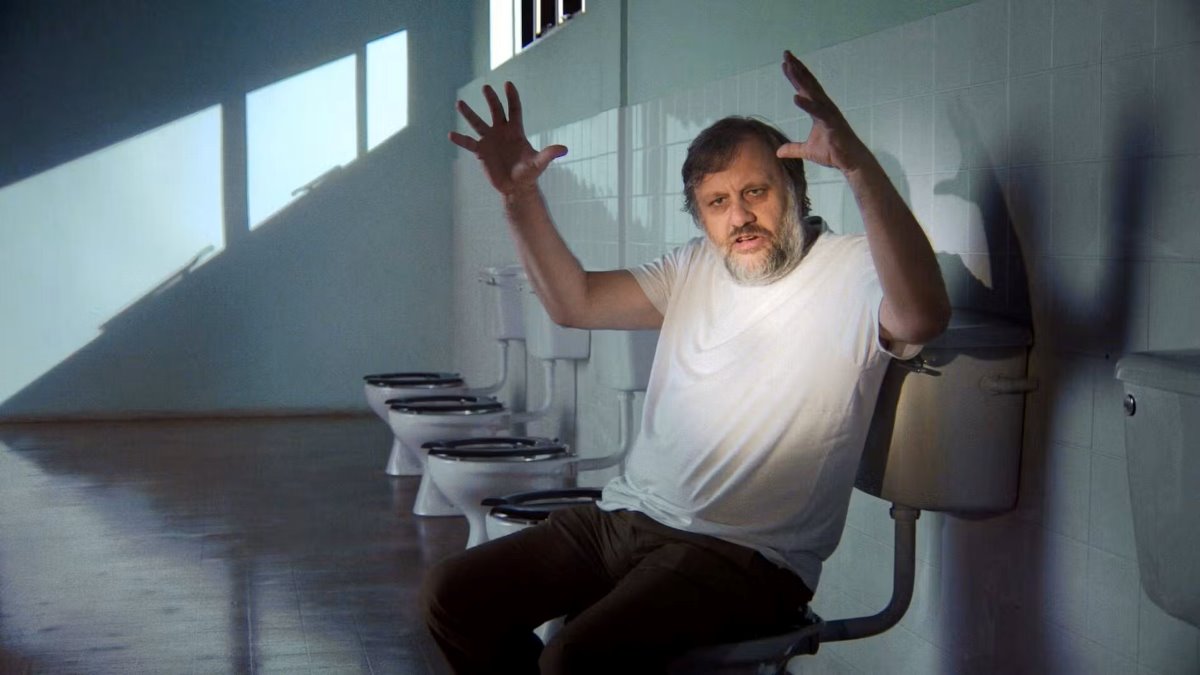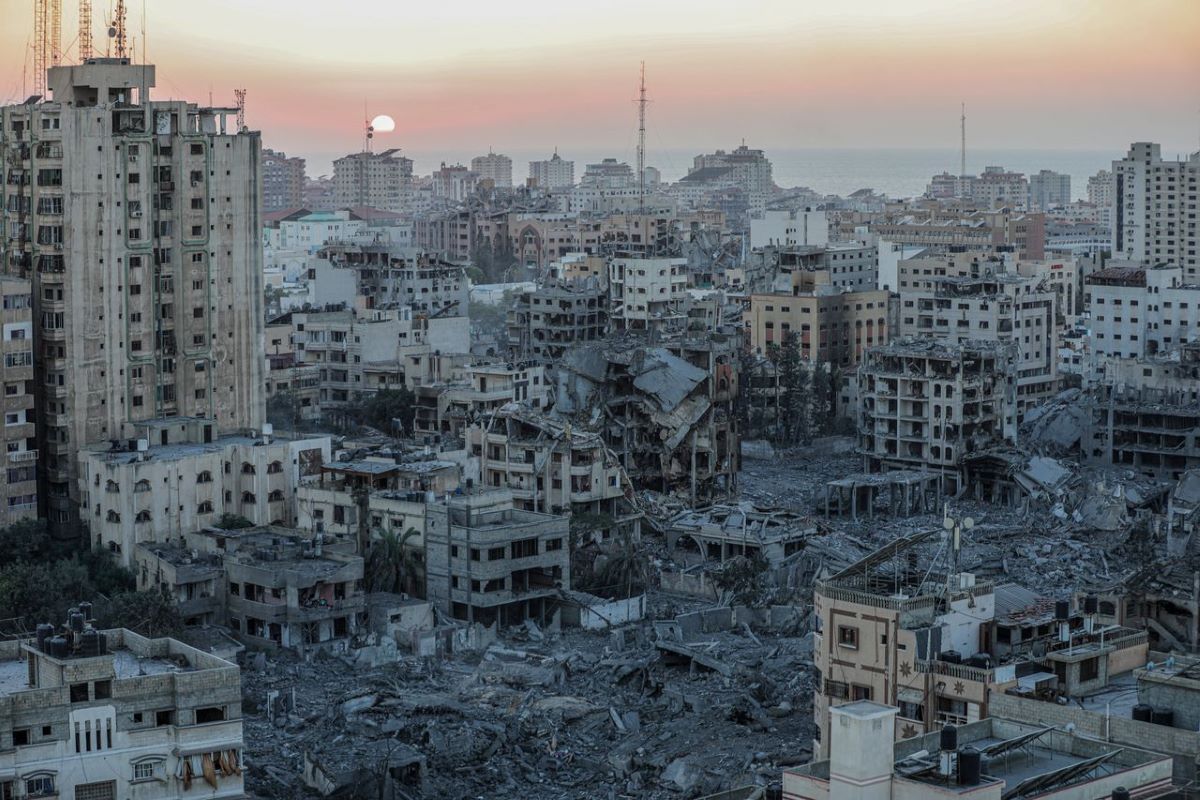Salman Rushdie criticized Hamas and the Western progressives’ sympathy for the group, associating them with the Taliban. His personal experience with Ayatollah Khomeini’s fatwa and the attack he suffered influence his critical view of radical Islamism. However, Žižek disagrees with Rushdie on the analogy between Hamas and the Taliban, emphasizing that the conditions leading to Palestinian radicalization are consequences of Israeli policies. According to Žižek, recognizing the Palestinian state and condemning Israel’s actions in the occupied territories is essential to stopping the violence and fostering a legitimate political process.
* * *
by Slavoj Žižek
On May 20, 2024, Salman Rushdie stated that if a Palestinian state were to be established today, a Hamas government would be “similar to a state governed by the Taliban.” The writer also criticized student protests against Israel, saying it is “strange” that progressive young people support Hamas, “a fascist terrorist group.” I understand his harsh stance, given what he endured due to Ayatollah Khomeini’s fatwa and the stabbing that nearly killed him. I sympathize with him when some of his leftist friends reproach him for “unnecessarily provoking” Muslims.
These accusations obviously stem from a pathological fear of some Western leftists of being Islamophobic. Any criticism directed at Islam becomes an expression of Western Islamophobia. Salman Rushdie is accused of unnecessarily provoking Muslims and thus (at least partly) being responsible for the fatwa that condemned him to death, etc. The result is predictable: the more Western leftists question their own guilt, the more Muslim fundamentalists accuse them of being hypocrites hiding their hatred for Islam. This perfectly reproduces the superego paradox: the more you obey what the other demands, the more guilty you become. It’s as if the more you tolerate Islam, the stronger its pressure on you becomes…
However, in the case of the Palestinian state, I disagree with Rushdie. When he cites the Taliban, the first thing I wonder is how the Taliban came to power in Afghanistan. The country had been relatively open to modernization until 1978 when the communists took control in a coup, and the Soviet Union intervened militarily to support their fragile authority, while the United States and Pakistan supplied arms to the Muslim resistance (the Taliban were led by Pakistani intelligence services). The rest is history. So it was foreign interventions (by the Soviet Union, Pakistan, and the United States) that pushed a relatively peaceful and pluralistic country toward a fundamentalist and authoritarian regime.
Similarly, what drives the Palestinians in the occupied territories into the arms of Hamas’ brutal resistance is that Israel does not allow the Palestinians to organize as an autonomous political entity. To put it bluntly, Israel “Hama-izes” the Palestinians to justify ethnic cleansing and to present Israel’s expansion “from the river to the sea” as self-defense.
Therefore, recognizing the Palestinian state and unequivocally condemning what Israel is doing in the occupied territories as a crime against humanity is the only way not only to curb Israeli military terror against civilians but also to compel the Palestinians to behave as a legitimate political force bound by international law and rules.
Recently, there have been some pleasant surprises in this regard. Students with their protests are not the only ones who have mobilized: Spain, Ireland, and Norway will recognize Palestine, and other Western countries are ready to do the same. On May 20, French Foreign Minister Stéphane Séjourné expressed support for the International Criminal Court (ICC) and the arrest warrants issued against Israeli Prime Minister Benjamin Netanyahu and three Hamas leaders for war crimes and crimes against humanity in Gaza and Israel. In its mandate, the court does not make any direct comparison between Israel and Hamas, except to say that both have committed crimes. A few days later, Belgium joined France.
It’s no surprise that the Biden administration threatens sanctions against ICC prosecutor Karim Khan. U.S. Senator Lindsey Graham warned: “If they do this to Israel, we will be next.”
Graham is right: it was previously assumed that the ICC would deal with countries in Asia, Africa, and Latin America; now it wants to apply the “international order based on law” worldwide, without exceptions. I believe these developments are important precisely because they reject using human rights as a pretext for Western domination and take them more seriously than they were conceived.
The threat doesn’t come only from the hypocritical promotion of human rights in the West: in one way or another, all major power blocs today play the same game. It’s not just that universal rules are not applied consistently: there is also a false universality that places aggressors and victims on the same level.
Take, for example, a recent episode that, as often happens, made me ashamed of the Slovenian “left.” When the merchant ship Borkum docked in the Slovenian coastal city of Koper on May 23, 2024, rumors spread that the ship was carrying weapons destined for Israel, and predictably, pro-Palestinian protesters demanded that the Slovenian government prevent the Borkum from docking.
But when a government agency clarified that there were no weapons on the ship headed for Israel, 43 organizations that had participated in the protest added the following statement: “Regardless of where the weapons’ final destination will be, Israel or the Czech Republic, and from there perhaps Ukraine, they are weapons for the armed forces of imperialist states that do not contribute to peace and do not defend workers. We, the signatories of this declaration, stand for peace and oppose armaments. Trafficking weapons for imperialist wars is unacceptable.”
Personally, I reject the fundamental equation between the Israeli destruction of Gaza (and beyond) and Kiev’s defense against the Russian attack, that is, considering Ukraine’s desperate struggle for survival as an “imperialist war.” This is why Putin’s recent commitment to a “free Palestine” is a lie supported by factual truth: it serves to obscure the commitment to a “free Ukraine” violated by Russia.
But now there are signs of hope. On May 24, 2024, the International Court of Justice (ICJ), the United Nations’ highest court, ordered Israel to “immediately stop” its military offensive in Rafah.
The ICJ’s rulings are final and binding, but there is no mechanism to enforce them. Here come the cynics, according to whom these grand public gestures of condemnation are empty and have no significant effect on the battlefield. But this judgment is wrong: the reaction of the pro-Israel establishment, panicked by the ICC mandate and the initiatives for recognizing Palestine, clearly proves it. Jean-Paul Sartre said it precisely: “When the authorities find it useful to tell the truth, it’s because they can’t find a better lie. Immediately this truth, spoken by official mouths, becomes a lie supported by facts.”
This is what happens when Western countries express “concern” about Israeli military violence in Gaza and the West Bank: despite criticisms of the Tel Aviv government, they continue to send weapons to its army. But Sartre’s thesis is not universal: there are ways of telling the truth that don’t become lies.
Recognizing the state of Palestine and obeying the ICC’s arrest warrant for Netanyahu fall into these cases. In the current inflation of solemn statements, we must never forget that not all words are equal, that there are still words that produce the effect of truth.
Most of us are familiar with the scene from the film A Few Good Men (Rob Reiner, 1992) where Tom Cruise says to Jack Nicholson, “I want the truth!” and Nicholson responds shouting, “You can’t handle the truth!” It’s a more ambiguous answer than it might seem: it shouldn’t be understood only in the sense that most of us are too weak to handle the brutal reality of things. If someone were to ask a witness the truth about the Holocaust, and that witness replied, “You can’t handle the truth!” it shouldn’t be understood only as a way of stating that most of us cannot process the horror of the Holocaust.
On a deeper level, it was the Nazi perpetrators themselves who couldn’t handle the truth: they were unable to accept that their society was traversed by a totalizing antagonism, and to avoid understanding it, they launched into a murderous frenzy against the Jews, as if that extermination could restore a harmonious social body.
Here lies the ultimate lesson of the horrors in Gaza and Ukraine: not only do we escape into fantasy to avoid fully facing reality, but we also escape into the reality (of brutal actions) to avoid the truth about the futility of our fantasies. Israel is fleeing into the reality of Gaza’s destruction to avoid the truth about its difficult situation in the Middle East, just as Russia is fleeing into the reality of Ukraine’s destruction to avoid the truth about the futility of its Eurasian fantasies. The cliché “Don’t just talk, do something!” should be reversed: “Don’t just do things, say the right word!”





